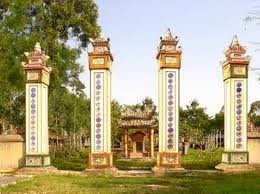(VOVworld) - There are almost 150 ancient communal houses in the central province of Thua Thien Hue. These places are not only of great architectural and historical value, but also house many ancient documents, revealing how Vietnamese people in central Vietnam settled and developed. A lot of attention has been paid to preserving and restoring these precious ancient documents.
Located in the central region of Vietnam, ancient Thua Thien Hue with its rugged terrain is an almanac of Vietnamese history. Thừa Thiên Huế originally rose to prominence as the capital of the Nguyễn Lords, a feudal dynasty which dominated much of southern Vietnam from the 17th to the 19th century. Hue remained as the political and cultural center of the Feudal State of Vietnam for over 400 years. Thua Thien Hue province is famous for its hundreds of historical and cultural sites, the most outstanding of which is a complex of 300 buildings from the period, including citadels, palaces, monuments, and communal houses used by the Nguyen Kings. It was recognized by UNESCO as a world cultural heritage in 1993. There are 50 intact communal houses in Hue city alone, with the oldest one built in 1558 in Cư Chánh village, Hương Thủy district in the west of the city. After undergoing many restoration projects, Cư Chánh village’s communal house with its horizontal lacquered boards, parallel sentences in script, statue of its guardian god, and especially its festival honouring the village’s founders, has stood the test of time and remains to this day. Villagers consider the communal house a holy symbol for their homeland. A former Cư Chánh villager, Nguyễn Ngọc Kết, said: "I was born and grow up in Cu Chanh village but then settled down in somewhere else. I am always very moved whenever I return to the village. The villagers are very unified and have been able to restore the communal house and keep it as a sacred place to worship our ancestors. A festival to commemorate our ancestors is held at this communal house during the 7th lunar month of every year."

Thu Le village's communal house. Photo: internet |
Hue’s Communal houses are also home to precious ancient documents that reflect the former imperial city’s time-honored history and its many traditions. These include documents in acient Chinese or Han Nom scripts, telling stories of the country’s struggles against invaders and how its culture, economy, history, and society were developing. The Dương Nỗ communal house in Phú Vang district, which was built during King Lê Thánh Tông reign, and restored in 1808, houses a collection of royal directives and documents, of which 22 have been copied to keep for future generations. The 450-year old Mỹ Lợi communal house in Phú Lộc district has 1000 pages in ancient Chinese script, that contain important historical information about the country, one document, written 250 years ago, even mentions Vietnam’s sovereignty over the Hoang Sa and Truong Sa or Paracel and Spratly archipelagos. Meanwhile, Luong Quan village’s communal house still retains the royal documents from King Đồng Khánh’s reign in 1887, confered to two of the village’s founders under the reign of King Lê Thánh Tông. Head of Lương Quán village, Đặng Văn Thiệp, told VOV: "Only 9 royal documents in our village’s communal house have stood the test of time. We recently held a solemn ceremony to carry these precious ancient documents to the communal house as we treasure these documents very much because they represent our ancestors and our history."
Since 2009, the provincial Department of Culture, Sports and Tourism has spared no effort when working with agencies across the country to carry out research on the ancient royal documents to preserve them. The province has now managed to digitalize 300 collections of over 70.000 pages of acient Chinese script to preserve them for posterity.
To Tuan